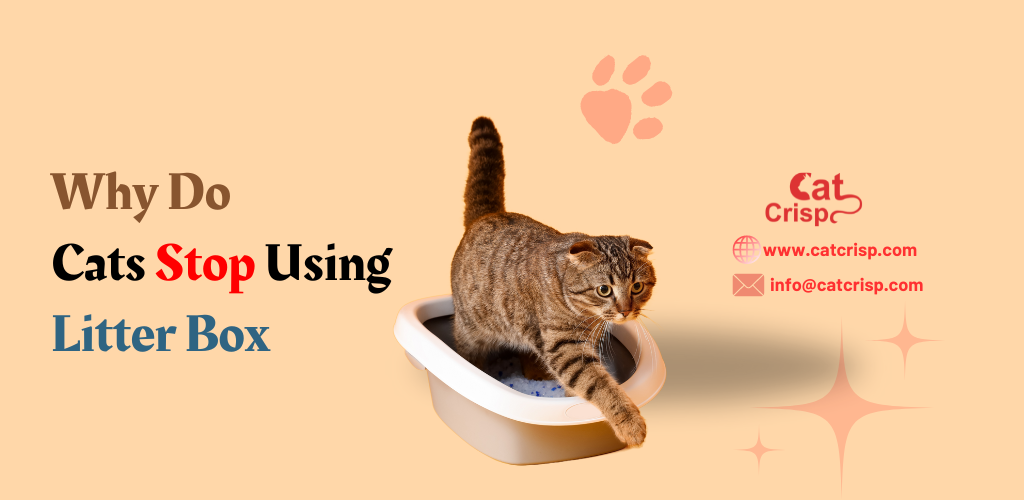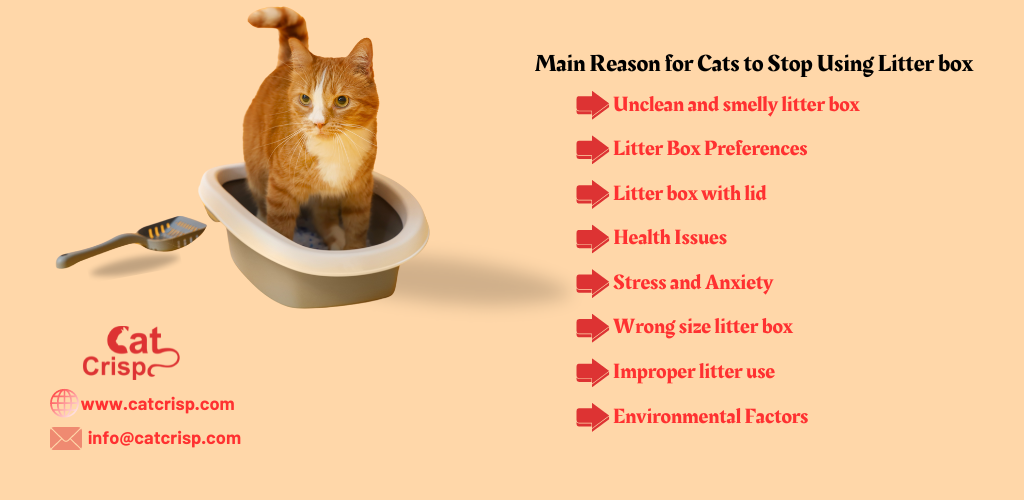Discover why do cats stop using the litter box and explore effective solutions to this common issue. Learn how to address various factors contributing to this behavior and create a conducive environment for your feline friend.
Cats are known for their independent nature and meticulous grooming habits, making them one of the most popular pets worldwide. However, even the most well-trained cats may sometimes develop issues with their litter box habits. Understanding why cats stop using the litter box is crucial for pet owners to address this behavior effectively.
Potty training a cat is easy because every cat wants to go to the toilet in a certain place. But when a cat stops using the litter box, it becomes a problem and cause for concern. There are some reasons why cats stop using this litter box. This problem can be solved if the correct cause is identified.

Table of Contents
ToggleWhy do cats stop using the litter box?
1. Unclean and smelly litter box: Cats are very clean creatures and do not want to use an unclean and smelly litter box. So, the litter box should be cleaned at least twice a day.
If litter is used, solid litter should be scooped out with a scoop, if sand/paper is used, dirty sand should be removed once a day and new sand should be given because wet places are very disliked by cats.
The litter box should be cleaned thoroughly once a week. When cleaning with soap or detergent, be sure to remove the soapy odor.
2. Litter Box Preferences: Cats are selective creatures, and they may have specific preferences when it comes to their litter box. Factors such as the type of litter, box size, cleanliness, and location can influence whether a cat chooses to use it.
Experimenting with different litter types, keeping the litter box clean, and providing multiple boxes in various locations can help accommodate your cat’s preferences.

3. Litter box with lid: This is a good litter box for cat privacy. But because it is closed, the smell cannot come out of this box and so the cat does not want to use it.
4. Health Issues: One of the primary reasons why cats may avoid the litter box is underlying health problems. If he feels pain or discomfort while toileting, he will not want to use the litter box. Contact a vet if you understand the problem.
5. Stress and Anxiety: Cats are sensitive to changes in their environment, and stress or anxiety can manifest in various ways, including avoiding the litter box. Common stressors for cats include changes in routine, new pets or family members, loud noises, or even rearranging furniture.
Creating a calm and predictable environment for your cat, along with providing enrichment activities and safe spaces, can alleviate stress and encourage litter box usage.
6. Wrong size litter box: If the cat cannot sit properly i.e. the litter box is small according to the size of the cat, then the cat will not want to use that litter box.
7. Improper litter use: Improper litter use causes cats to leave the litter box. The soles of cat’s paws are very soft. Cats don’t want to go to places that are hard or painful.
Easy to dig and cover, light-colored litter like sand is preferred by cats. Cats do not like flowery or smelly litter. An adequate amount of sand or litter should be provided.
8. If there is not enough litter box: If there are more than two cats, then they will not all use one litter box. Also, it will get dirty with more use. So if there are more cats, please arrange a minimum of 2-3 litter boxes.
9. Keeping the litter box in the wrong place: Keeping the litter box in a closed room will spread the smell in the room, so the litter box should be kept in an open place and where the cat can easily travel.
Of course, the food area and the litter box area should be different. Litter box should not be placed in noisy places where people move.
10. While in Heat: Cats in heat may pee in various places to attract other cats. Then he does not want to use the litter box. And so if spay/neuter after 5 months of age, the cat will not come into heat.
11. Aging and Mobility Issues: As cats age, they may experience mobility issues, making it challenging for them to access the litter box comfortably.
Arthritis, muscle weakness, or other age-related conditions can deter cats from using high-sided or covered litter boxes. Switching to low-entry litter boxes with easy access or providing ramps can accommodate senior cats’ needs and encourage consistent litter box usage.
12. Environmental Factors: External factors such as extreme temperatures, humidity, or inadequate ventilation in the litter box area can influence a cat’s comfort and willingness to use it.
Maintaining a clean, well-ventilated litter box area with moderate temperatures can create a pleasant environment conducive to regular litter box usage.
What to do if the cats stop using the litter box?
- Always keep the litter box clean and change it every day. Keep it clean with baking soda or unscented soap.
- Most cats prefer to use large litter boxes. This makes it easy for him to enter the litter box.
- Do not deepen the litter box more than an inch or two.
- Use odorless litter boxes. Cats peeve odorless litter boxes.
- Allow the cat to use the same litter box that the cat used when it was young.
- Avoid litter boxes with lids.
- Place the litter box in a quiet area. Also be careful if they like the place. If it doesn’t like it, try to understand the cat’s preference by placing the litter box in different places if necessary otherwise cats stop using the litter box.
- Self-cleaning litter boxes are gaining popularity these days. Cats can quickly adapt to it. However, cats may not accept it well. In that case, use an old-fashioned litter box.
Conclusion
In conclusion, understanding why do cats stop using the litter box requires careful consideration of various factors, including health, environment, behavior, and preferences.
By identifying the underlying cause and implementing appropriate solutions, pet owners can effectively address litter box issues and ensure their feline companions maintain good litter box habits.
Remember, patience, consistency, and a proactive approach are essential for resolving litter box problems and promoting a harmonious relationship between you and your cat.

